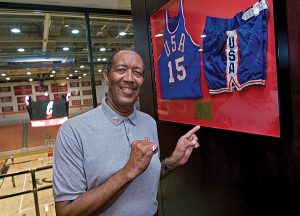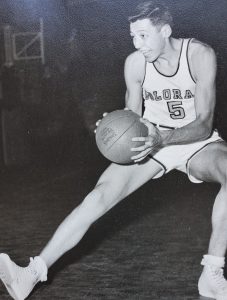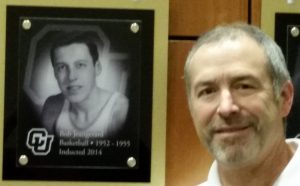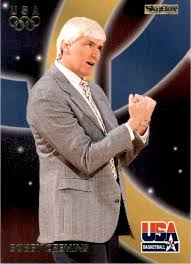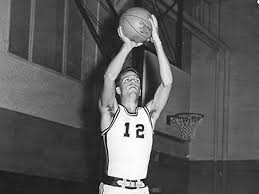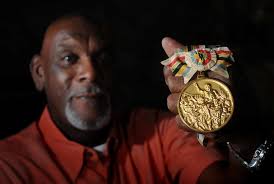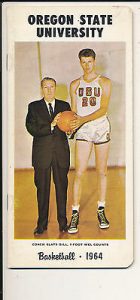The NBA Finals date back to 1947 (when they were known as the Basketball Association of America Finals) and the very 1st NCAA tourney was held in 1939. Olympic basketball competition is even older: it debuted as a demonstration event in 1904 and the men’s version became a medal sport in 1936, with the women finally getting their chance to go for the gold in 1976. The United States has dominated Olympic basketball competition from the start: the men have won 15 gold medals in the 18 tournaments they have participated in during the past 84 years, while the women have won 8 gold medals in the 10 tournaments in which they have competed during the past 44 years. Those of you who were looking forward to the 2020 Olympics opening ceremonies in Tokyo on July 24, 2020 will have to wait an extra 364 days, as the coronavirus caused a postponement until July 23, 2021. Due to the absence of college basketball since mid-March, HoopsHD’s Jon Teitel decided to fill the void by trying to interview as many prior Olympic players/coaches as possible so that you have something to read this summer while not watching the Summer Games. We continue our coverage by chatting with George Wilson about winning an NCAA title in 1962 and winning a gold medal in 1964.
At John Marshall High School you led your team to a pair of state titles in 1958/1960 and won the very 1st Chicago Sun-Times POY award in 1960: how good were you back in high school, and what made you choose Cincinnati? We were undefeated in 1958, got ripped off by a referee in 1959, and made sure that the officials were not involved in 1960. People ask me about my greatest accomplishment and I say beating the Catholic school at Chicago Stadium: we were the 1st public school to beat them in 1957. In 1958 we were the 1st team from Chicago to win the state title and only the 2nd African-American team to win it (Crispus Attucks featuring Oscar Robertson was the 1st in 1955). Most of the guys from that team graduated in 1958 but we still made it back to the Sweet 16 in 1959. I never got in foul trouble but that ref called 2 fouls against me in the 1st quarter and another 1 by halftime despite me having my hands straight up in the air. My teammate MC Thompson had no fouls at halftime but ended up fouling out in the 2nd half and we lost on a last-second shot. I did not want to go into basketball coaching because I could never trust a referee after that but I did coach some track and field…and we went undefeated! We had 17,600 fans in Chicago Stadium for our game at 2PM: the Globetrotters cam in that night and had 17,800.
In 1960 you were named 1st-team Parade All-American: which of your fellow honorees impressed you the most (Bill Bradley/Roger Brown/Connie Hawkins/other)? Roger was awesome: even Oscar said that he was 1 of the best players he had ever seen. Jeff Mullins was also on the 1st-team: we both won NBA titles after becoming Olympic teammates.
Take me through the magical 1962 NCAA tourney:
In the Final 4 you scored 3 PTS and Tom Thacker made the game-winning 15-foot jumper with 4 seconds left in a 2-PT win over UCLA: where does that rank among the most clutch shots that you have ever seen? I do not remember the shot that well but we beat UCLA again in 1963 before they began their great run.
In the title game you had 11 REB in a win over Ohio State in a rematch of the 1961 title game: what did it mean to you to win a title? John Havlicek averaged more than 20 PPG in the NBA but I held him to 11 PTS/5-14 FG that night. I always tell kids that if you do your job then your whole team might be able to win a ring. My job was to defend the best scorers on the opposing teams like Paul Silas/Chet Walker.
In the 1963 NCAA title game you had 10 PTS/13 REB in 41 minutes in a 2-PT OT loss to Loyola Chicago: how big a deal was it to be part of the 1st title game ever where a majority of the players were African-American (Loyola started 4 African-American players and Cincinnati started 3)? They really publicized that fact that year. Loyola had to play Mississippi State after sneaking out of town to do so. That was another game that the zebras took from us. Les Hunter made a deliberate goaltending play toward the end of the game that was not called, then Larry Shingleton (who was an 80% FT shooter) made 1 FT and then missed 1 badly at the end of the game.
In the spring of 1964 you were a territorial pick of the Cincinnati Royals: what was it like to become teammates with fellow former Bearcat Oscar Robertson? Imagine becoming a teammate of your hero: I was riding on cloud 9…and 10..and 11!
You were not invited to the 1964 Olympic trials as part of the NCAA all-star team because your teammate Ron Bonham was the Cincinnati representative, but as a member of an AAU all-star team you had 19 REB in a win over the NCAA all-stars to make the final roster: how pissed were you to not make the NCAA all-star team, and how excited were you to finally earn a ticket to Tokyo? Somebody should make a movie about this. Bonham and I were both All-Americans so he was also very deserving. They picked 16 total teams: 3 from the NCAA, 2 from the AAU, 1 from the NAIA, etc. They picked Bonham for the NCAA team and Coach Ed Jucker called them up to complain. I was in the dorm 1 day and MC Thompson told me that he was playing for an AAU team whose big man had just gotten hurt. I said that I would play for them at a big tourney in Denver. Before the week was over the head of the Olympic Trials called to say that Gary Bradds from Ohio State got hurt and asked me if I would take his place…and I said no because I had already made a commitment to MC. We were getting killed during the 1st game in Denver: the coach put me in during the 2nd half and I knew to only run when necessary due to the altitude. We made a nice comeback and ended up only losing by single digits. I ended up making 1 of the 2 AAU All-Star teams and MC made the other team. Goodyear won the tourney with Larry Brown and I was on 1 of the teams that went to the Olympic Trials. I ended up playing center at the Trials and the 1st team we played was a team with a bunch of UCLA players and a coach named John Wooden but we beat them. In the 2nd round we played Bonham’s team and beat them. Then we played a team with a bunch of All-Americans like Rick Barry/Bill Bradley/Mullins and we beat the heck out of them so I went out and partied like I always did. I came back around 2AM and some guy congratulated me but I did not know exactly what for. The next morning I got a call from Coach Hank Iba to say that I made the final roster…but I thought it was someone playing a joke by calling me that early!
What did it mean to you to represent your country, and what did it mean to you to win a gold medal? It was the 2nd best accomplishment of my life. Bill Russell/KC Jones were the 1st 2 African-Americans to make the Olympic team in 1956, then a few more in 1960, and then I was 1 of 5 in 1964. I was representing my race, my school, and my city: I worked hard and finally made it. We were 9-0 and beat Russia for the gold medal. We beat most teams badly but only beat Yugoslavia by 8 PTS. Coach Iba put me in during the final quarter against Yugoslavia for my rebounding/defense and we were only up 4 PTS with about 2 minutes left. Dick Davies passed me the ball and I was trying to get it into Luke Jackson but my man backed up to double-team him and Dick was covered as well. I saw the clock ticking down, took 2 dribbles to the side, and let it go: bingo! Larry Brown brings the ball up on our next possession, my defender backed off, Larry was covered, so I shot it again: cha-ching! History could have been very different if I had missed either of those shots so that was my claim to fame.
You later competed in basketball/golf/horseshoes in the Senior Olympics: which sport were you best at, and which sport did you enjoy the most? I enjoyed horseshoes/golf. We had a choice of 9 or 18 holes of golf: I only played 9 holes and I went 20 straight years without losing. We would pitch horseshoes when I was younger. 1 year I had 8 leaners that should have been worth 2 PTS each but they only gave me 1 PT for each of them. I really enjoyed it. I played in the Senior Olympics for 27 straight years until it got canceled this year due to the coronavirus.
In 2006 you were voted 1 of the 100 Legends of the Illinois High School Association Boys Basketball Tournament: where does that rank among the highlights of your career? They gave us a sport coat so whenever I wear it people ask me about it. I am also 1 of only 3 IHSA players to be named All-State 1st-team for 3 straight years.
What is it like to be an African-American man in 2020, and are there any thoughts you would like to share about George Floyd/protests/police/etc.? I have been listening to the radio and watching TV. I am 87 years old but the protests all over the world should tell the US that its history is terrible. Some people have only recently learned about the riots in Tulsa on Black Wall Street a century ago but as a history buff I have known about it for a long time. We are the only race that had our name changed over the years. Some people say that you should not blame them for something their grandfather did but I just want them to be aware of what happened back in the day. It is finally coming out now: I just saw the video of the young man in Colorado who died after walking home from the grocery store. When people call 911 and say that there is a Black man who looks suspicious the police will show up ready to shoot. Just imagine how many incidents were not caught on camera that we will never know about. A lot of people were hung and nobody was ever charged. Everyone in Tulsa knew who dropped the bomb but nobody got charged. I have been through things and have never had a good traffic stop. I had a run-in once at a shopping center after a car accident. I offered to be a witness if necessary and the cop asked me for my Social Security #: I later found out that he could use that to check his system to see if I had ever committed a crime. I once pulled into the parking lot of my doctor’s office and had a woman call me a thug and then call the police because she thought that I was driving too slowly. When I got home 1 of the policemen called me to say that everything was fine. I have heard so many stories from other people: I have a friend who is a cop who got pulled over once when he was younger. The cop who pulled him over laid his gun on the car and called my friend “boy”. I played ball, made good money, and lived all over the world….and never got a ticket. Even when it on a cell phone people still try to deny it. It is 2020 but I am still disgusted by what is happening with these cops who have a license to kill.

